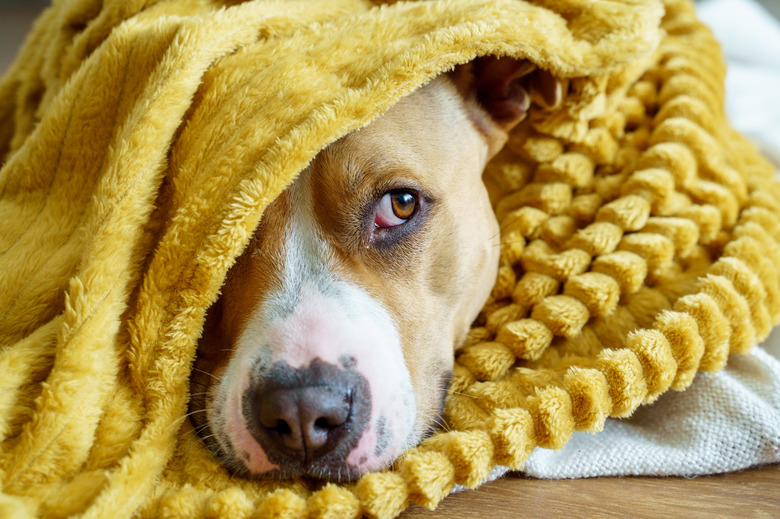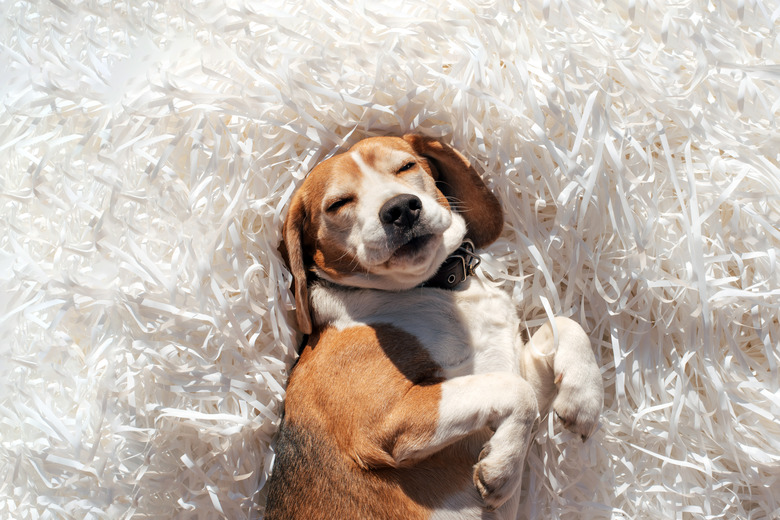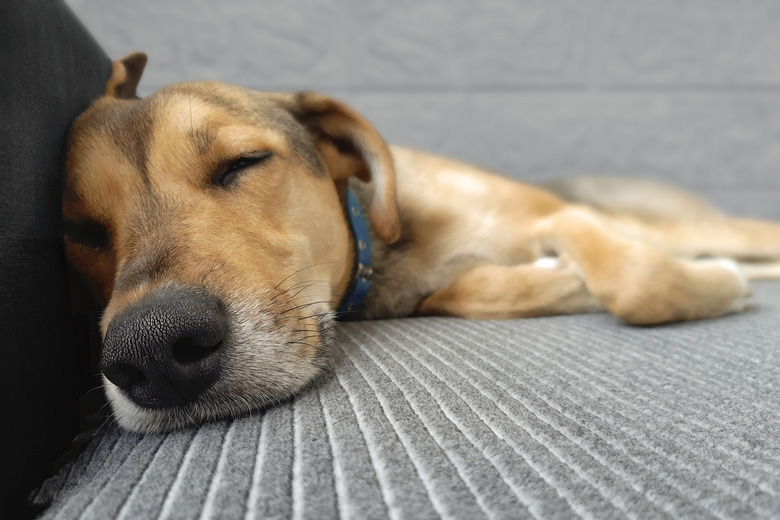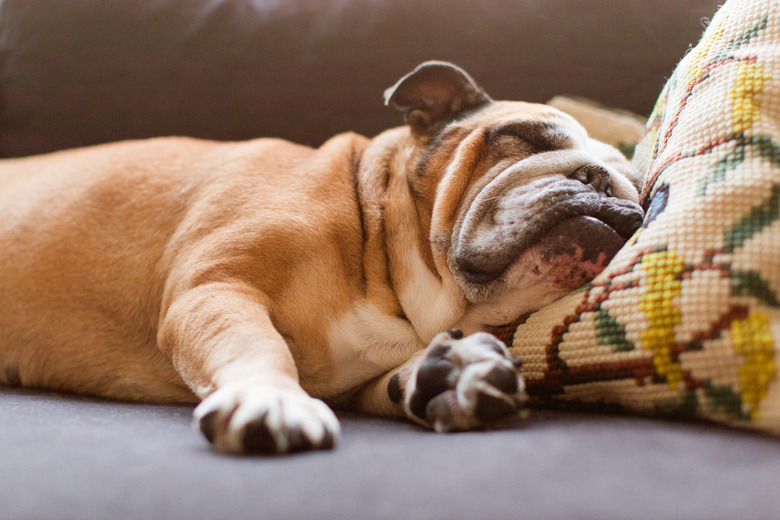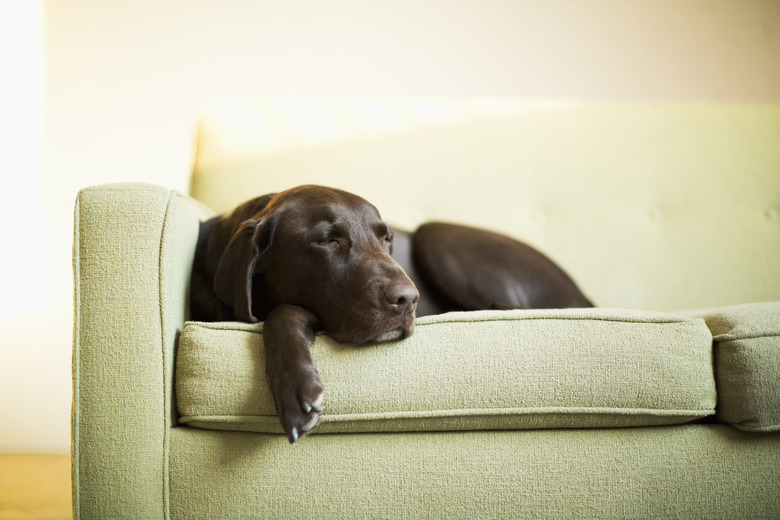Can Dogs Have Nightmares? Should I Wake My Dog Up From A Nightmare?
If you share a home with a dog, you're probably too familiar with this scene—your canine companion drifts off, and then 20 minutes later they're twitching, running, and making strange little bleeps and bloop sounds with their mouths. You may have wondered if this means that your dog is dreaming, and the answer is yes, that's exactly what's happening! Dogs dream, but what do they dream about? And if they can dream, does that mean dogs can have nightmares too? Read on to find out!
Do dogs dream?
Do dogs dream?
Yes, they do! Dogs go through the same sleep cycles that we do, including REM, or rapid eye movement sleep. REM sleep is the phase of sleep when most dreaming occurs, and nearly all of the dreams that we remember happen during this time, but some dreaming can occur during slow-wave sleep, which happens just before REM kicks in. REM starts about 20 minutes after most adult dogs fall asleep, and it's during this phase of slumber that you'll see a dog's eyes start fluttering and their muscles start twitching, which are all evidence of active dreaming.
A lot of pet parents have noticed their dogs' legs moving as if they're walking or even running in their sleep, which is usually laughed off as "chasing rabbits." As it turns out, that could be exactly what your canine pal is doing! As reported by the American Kennel Club, a famous MIT study involving rats concluded that the rodent subjects observed most likely dreamed about what happened during their waking life. In the study, the rats were released in a maze and their brain wave patterns were measured by researchers. The same measurements were taken while the rats were asleep, and when the results were compared they showed that the same brain activity lit up, suggesting that the rats dreamed about their experiences in the maze earlier that day while they rested.
What do dogs dream about?
What do dogs dream about?
Well, just as most people tend to dream about things that occur in their human lives, and rats evidently dream about things that occur in theirs, it's safe to assume that dogs dream about dog things. We witness evidence of this when we see our furry friends exhibit dog behaviors even during restful sleep episodes, like a wag of the tail, running, and even barking if their bodies allow it. We would see even more if their bodies fully allowed us to, but they don't thanks to something in the brainstem known as the pons.
Dogs, like people, rely on this mechanism to keep them safe while they sleep. It inhibits their muscle movement to prevent them from acting out what is going on in their dreams, which for some dogs could look like running, jumping, swimming, eating, or even biting. Psychology Today reported on a study in which researchers temporarily removed the function of the pons just to see what dogs would do while they sleep. They found that those dogs did act out what was believed to be going on in their dreams! And because dreams are specific to the dreamer's life and experience, it could mean that dreams may take on dog breed-specific themes—pointers may hunt, retrievers may retrieve, and small dogs like Chihuahuas may bark and alert their guardians, all from the comfort of their dog beds.
Do dogs have nightmares?
Do dogs have nightmares?
The ability to dream also comes with the ability to have a bad dream every once in a while, and unfortunately, dogs can have those too. Like human nightmares, these may not be reflected by their real-life activities every time, although dogs who have undergone traumatic experiences could be more prone to having them. It may seem that younger dogs and older dogs have more nightmares than adult canines, but this isn't necessarily the case—dogs at either end of the life cycle just have a weaker pons function, which is why they tend to twitch, bark, and move a bit more than some others.
Should I wake my dog up from a nightmare?
Should I wake my dog up from a nightmare?
If you think your dog is having a nightmare, it's best to leave them alone. There is a risk of injury to both of you if you interrupt them, and in addition, dogs need uninterrupted REM sleep just like humans do. Even though it's tempting to wake them from a nightmare, it's best to just let them sleep. You can always offer them some consoling or positive reinforcement when they do wake up, just to let them know that they're safe and loved, no matter what happens during deep sleep.
The bottom line
The bottom line
Dogs can dream, and that may include nightmares from time to time. You can usually tell when sleeping dogs are dreaming by their eye movement, which may dart back and forth while they're closed, or even flutter open for a second. Studies have shown that mammals like rats likely dream of their waking life while they're sleeping, and research suggests that dogs do the same thing. The pons renders dreamers, including canines, mostly immobile while they rest, but you can sometimes see evidence of dog-specific behaviors like tail wagging, barking, whimpering, and running with all four legs. If your dog is having a nightmare, it's best to let them just ride it out—the REM phase of sleep in dogs usually lasts no more than a couple of minutes.
